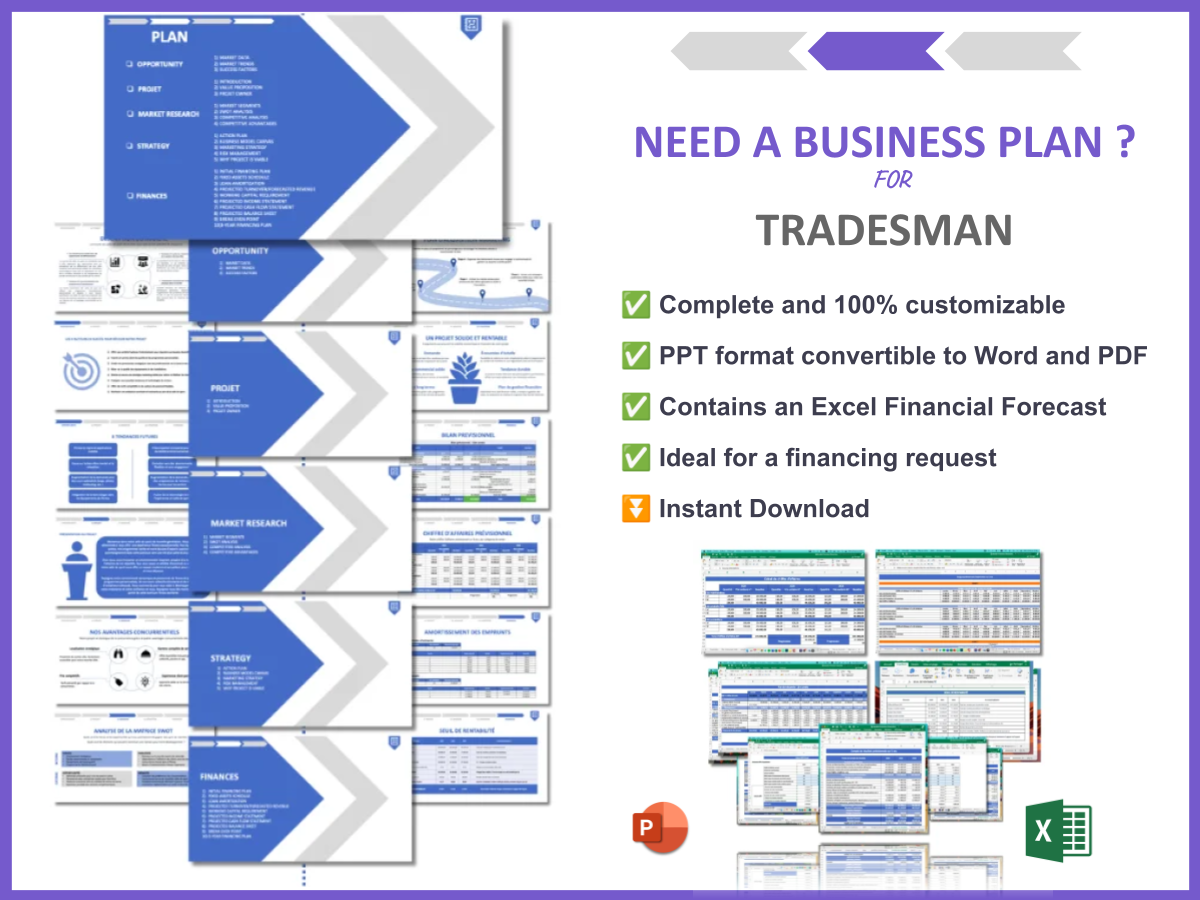Are you thinking about starting a tradesman business? You’re not alone! The tradesman industry is booming, with demand for skilled professionals rising every year. In fact, over 60% of homeowners report needing some form of tradesman service in the past year. This statistic highlights the lucrative opportunities available for those looking to enter this field. How to Start a Tradesman business involves a series of strategic steps that can set you up for success. From defining your niche to marketing your services, this guide will cover essential insights and practical advice to help you kickstart your journey.
- Define your niche and services.
- Conduct market research and analyze your competition.
- Choose a catchy and memorable name.
- Create a comprehensive business plan.
- Determine the legal structure for your business.
- Secure funding and financial resources.
1. Define Your Niche and Services in the Tradesman Business
Before diving into the practicalities, it’s crucial to pinpoint exactly what services you’ll offer as a tradesman. The tradesman field is broad, and identifying your niche will help you stand out in a crowded market. Here are a few questions to guide your decision:
- What specific skills do you possess? For example, are you a skilled electrician, plumber, or carpenter?
- What services are in high demand in your local area? Researching local trends can give you valuable insights.
- How can you differentiate yourself from existing tradesman businesses? Consider unique offerings or specialized services.
By answering these questions, you can define your niche effectively, ensuring that you align your skills with market needs.
2. Conduct Market Research and Analyze Your Competition for Your Tradesman Business
Understanding your market is key to success in the tradesman industry. Conducting thorough market research helps you gauge potential demand for your services and identify competitors. Here are some effective methods to gather information:
| Research Method | Description |
|---|---|
| Online Surveys | Utilize tools like Google Forms to create surveys and gather feedback from potential customers about their needs. |
| Competitor Analysis | Identify local competitors, analyze their strengths and weaknesses, and learn from their successes and failures. |
| Community Engagement | Attend local events or forums to talk directly with community members and understand their expectations from tradesman services. |
By utilizing these research methods, you’ll gain insights that will inform your business strategy and help you tailor your offerings to meet the needs of your target market. Additionally, consider keeping a competitor analysis document to track their pricing, services, and customer reviews. This will provide a solid foundation for positioning your own business effectively.
3. Choose a Catchy and Memorable Name for Your Tradesman Business
Your business name is your first chance to make a lasting impression on potential clients. A well-chosen name can convey professionalism and attract customers. Here are some tips to consider when selecting a name:
- Keep it Short and Simple: A concise name is easier to remember and share.
- Make it Relevant: Your name should reflect the services you provide. For example, if you specialize in plumbing, consider including that in your name.
- Check Availability: Ensure the name isn’t already in use by another business, and check domain availability if you plan to create a website.
Consider brainstorming with friends or family to gather ideas. Once you have a shortlist, test them out on potential customers to see which resonates best. A strong name sets the tone for your brand and can help you stand out in the competitive tradesman market.
4. Create a Comprehensive Business Plan for Your Tradesman Business
A solid business plan is crucial for laying the groundwork for your tradesman business. It outlines your goals, strategies, and financial projections, serving as a roadmap for your success. I recommend checking out this business plan template for Tradesman. It’s super detailed and can save you a ton of time! Here’s a breakdown of what to include in your business plan:
| Section | Description |
|---|---|
| Executive Summary | A brief overview of your business concept, including your mission statement and objectives. |
| Market Analysis | Insights into your target market, including demographics, needs, and competitive landscape. |
| Financial Projections | Estimates of income, expenses, and profitability over the next few years. |
By including these sections, you’ll create a comprehensive plan that not only guides your decisions but also helps attract investors or lenders if you need funding. A well-prepared business plan can significantly increase your chances of success in the tradesman industry.
5. Determine the Legal Structure for Your Tradesman Business
Choosing the right legal structure for your tradesman business is a critical decision that affects your liability, taxes, and how you operate. Here are some common structures to consider:
| Structure | Pros | Cons |
|---|---|---|
| Sole Proprietorship | Easy to set up and manage; complete control. | Personal liability for business debts and obligations. |
| Limited Liability Company (LLC) | Protects personal assets from business liabilities; flexible tax options. | More paperwork and higher costs to set up. |
| Partnership | Shared responsibilities and resources; easy to establish. | Shared profits and potential for disputes. |
When deciding on the structure, consider your business goals, the level of risk you’re willing to take, and the resources available to you. Consulting with a legal professional or a business advisor can provide valuable insights tailored to your specific situation. The right choice will not only protect you but also position your business for growth.
6. Secure Funding and Financial Resources for Your Tradesman Business
Securing the necessary funding is a vital step in starting your tradesman business. Without adequate financial resources, it can be challenging to cover startup costs and operational expenses. Here are some options to consider:
- Personal Savings: Using your savings can be a straightforward way to fund your business without incurring debt.
- Small Business Loans: Many banks and credit unions offer loans specifically for small businesses. Research various lenders to find the best terms.
- Grants: Look for local or government grants aimed at supporting small businesses in the tradesman industry.
Before applying for funding, create a detailed budget that outlines your startup costs, including tools, licenses, insurance, and marketing expenses. This will not only help you understand how much you need but also demonstrate to potential lenders that you are prepared and serious about your business. Being financially savvy from the start can significantly increase your chances of long-term success.
7. Register Your Business to Make Your Tradesman Business Official
Registering your business is a crucial step in establishing your tradesman business legally. This process not only legitimizes your operations but also allows you to operate under your chosen business name. Here’s how to go about it:
- Choose Your Business Name: Ensure it aligns with your services and is available for registration.
- File the Necessary Paperwork: Depending on your location, you’ll need to file forms with your local or state government.
- Obtain an Employer Identification Number (EIN): This number is essential for tax purposes and hiring employees.
Registering your business can seem daunting, but it’s a straightforward process if you follow the necessary steps. Consider consulting with a legal expert to ensure you’re complying with all local regulations. This will help you avoid any future legal complications and pave the way for a smooth operation.
8. Obtain Necessary Tax Identification Numbers, Licenses, and Permits for Your Tradesman Business
Once your business is registered, the next step is to secure the necessary tax identification numbers, licenses, and permits. This is vital for operating legally and avoiding fines. Here’s what you typically need:
- Tax Identification Number (TIN): This is required for tax purposes and can usually be obtained through the IRS.
- Business Licenses: Depending on your trade and location, you may need specific licenses to operate legally.
- Permits: Certain trades, such as plumbing or electrical work, often require permits to ensure compliance with safety standards.
It’s essential to research the specific requirements for your trade in your area. Failure to obtain the necessary licenses and permits can lead to hefty fines or even business closure. Keep a checklist of all required documentation to ensure you’re fully compliant and ready to serve your clients without any legal hurdles.
9. Apply for Business Insurance Coverage for Your Tradesman Business
Protecting your tradesman business with the right insurance coverage is crucial for safeguarding your assets and managing risks. Here are some common types of insurance you should consider:
| Type of Insurance | Description |
|---|---|
| General Liability Insurance | Covers claims related to bodily injury or property damage that occur during your work. |
| Workers’ Compensation Insurance | Provides coverage for employees who get injured on the job, protecting both them and your business. |
| Property Insurance | Protects your tools, equipment, and business property from theft or damage. |
Investing in the right insurance can save you from financial ruin in case of accidents or lawsuits. Consult with an insurance agent to assess your specific needs and ensure you have comprehensive coverage tailored to your tradesman business. Remember, being prepared is key to long-term success.
10. Set Up Your Financial Management Systems for Your Tradesman Business
Effective financial management is vital for the sustainability of your tradesman business. Having a system in place will help you track income, expenses, and overall financial health. Here are some essential steps to consider:
- Open a Separate Business Bank Account: This will help you keep your personal and business finances separate, making accounting easier.
- Implement an Invoicing System: Use software or templates to create professional invoices for your clients, ensuring timely payments.
- Track Your Expenses: Keep detailed records of all business-related expenses to help with budgeting and tax preparation.
Consider using accounting software to automate many of these tasks. Popular options like QuickBooks or FreshBooks can simplify your financial management, allowing you to focus more on your trade. Regularly reviewing your finances will help you make informed decisions and keep your business on the path to success.
11. Establish Your Brand Identity for Your Tradesman Business
Your brand identity is how your business is perceived in the market, and establishing a strong brand is essential for attracting and retaining customers. Here are some key elements to focus on:
- Create a Memorable Logo: A professional logo can help your business stand out and be easily recognized.
- Choose Brand Colors and Fonts: Consistent use of colors and fonts across all marketing materials creates a cohesive look.
- Develop a Unique Selling Proposition (USP): Clearly define what makes your tradesman services different from competitors.
By focusing on these aspects, you can create a brand that resonates with your target audience. Remember, a strong brand identity fosters trust and loyalty, which are vital for long-term success in the tradesman industry. Consider getting feedback from friends or potential clients on your branding to ensure it communicates the right message.
12. Develop a Professional Website for Your Tradesman Business
In today’s digital world, having a professional website is crucial for your tradesman business. It serves as your online storefront and can significantly impact your credibility. Here’s how to create an effective website:
- Showcase Your Work: Include a portfolio of your completed projects to demonstrate your skills and expertise.
- Make Contact Information Easily Accessible: Ensure that your phone number, email, and contact form are prominently displayed.
- Optimize for Search Engines: Use relevant keywords, like tradesman services, throughout your site to improve your visibility in search results.
Consider using website builders like WordPress or Wix, which offer user-friendly templates. A well-designed website can attract new clients and help you establish a strong online presence.
13. Market and Advertise Your Tradesman Business
Once your tradesman business is set up, it’s time to get the word out! Effective marketing strategies can help you reach your target audience and grow your client base. Here are some strategies to consider:
- Utilize Social Media: Platforms like Facebook and Instagram can help you showcase your work and connect with potential customers.
- Implement Local SEO Techniques: Optimize your website and online listings for local searches to attract nearby clients.
- Network with Local Businesses: Building relationships with other local businesses can lead to referrals and partnerships.
Consider creating promotional materials such as flyers or business cards to distribute in your community. Consistent marketing efforts will help your tradesman business grow and thrive, ensuring you remain competitive in the marketplace. Remember, it’s all about visibility and reputation, so invest time in building a solid marketing strategy!
Conclusion
Starting a tradesman business can be an exciting and rewarding venture. By following the steps outlined in this guide, you’ll be well on your way to establishing a successful operation. Remember to focus on defining your niche, conducting market research, and creating a solid business plan. As you move forward, don’t overlook the importance of building your brand and marketing your services effectively.
To further enhance your knowledge and skills, I encourage you to check out our articles on creating a SWOT Analysis for Tradesman and developing a Tradesman Marketing Plan. These resources provide valuable insights that can help you navigate the challenges of running a tradesman business and set you up for long-term success.
FAQ
- What qualifications do I need to start a tradesman business?
While specific qualifications vary by trade, it’s essential to have relevant skills and possibly certifications or licenses. Check local regulations for your specific trade requirements.
- How can I find clients for my tradesman business?
Utilize online platforms, social media, and local advertising. Networking with other local businesses can also lead to referrals.
- What types of insurance do I need for a tradesman business?
Common types of insurance include general liability, workers’ compensation, and property insurance to protect your assets and manage risks.
- How much money do I need to start a tradesman business?
The startup costs can vary significantly based on your trade, but it’s important to create a detailed budget that includes tools, licenses, insurance, and marketing expenses.
- Do I need a business plan for my tradesman business?
Yes, a comprehensive business plan is crucial for outlining your goals, strategies, and financial projections, making it easier to secure funding and guide your operations.
- What licenses and permits do I need for a tradesman business?
Licenses and permits vary by trade and location. Research local regulations to ensure compliance with all legal requirements.
- How can I market my tradesman services effectively?
Use social media, local SEO techniques, and networking to promote your services. A professional website can also enhance your online presence.
- What is the best way to manage finances in a tradesman business?
Open a separate business bank account, track income and expenses diligently, and consider using accounting software to simplify financial management.
- How important is customer service in the tradesman business?
Exceptional customer service is crucial for building a loyal client base, generating referrals, and maintaining a positive reputation in your community.
- What are the common challenges faced by tradesman businesses?
Common challenges include competition, managing cash flow, obtaining necessary licenses, and navigating regulatory requirements. Being prepared and adaptable is key to overcoming these hurdles.







